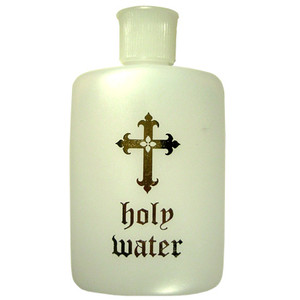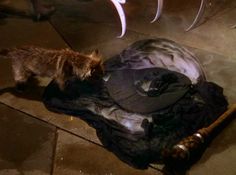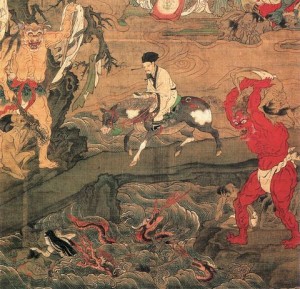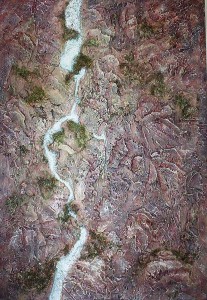Throughout history and across all folklore there are creatures which are supernaturally powerful and capable of doing great harm to mankind. They may be undead, they may be immortal, or they may be invincible to all mortal injury. But as these stories come to light there is invariably also a weakness that they possess, a personal kryptonite which prevents them from being able to just destroy human civilization entirely. Previously I discussed why silver possesses it’s mythical ability to ward off evil, but there are plenty of elements which can do the same.
One of the most common of these mystical weaknesses is, as the title says, “holy water”. There’s been a long history of water being used as a means of cleansing evil and of purifying darkness. We often see it being used to ward away evil, anoint the living, and wash away someone’s sins – especially when religion is applied. But some creatures have had weaknesses to water even before religion was applied and some of these weaknesses don’t even require that they come in contact with it.
Why is it that some stories of faeries say they can’t cross the sea and stories of vampires insist that they can’t cross running water without the help of another? Clearly these sources of water aren’t sanctified like the water being splashed around by a priest. Yet these bodies of water hold the same sort of sway over these creatures despite this lack of “holy”. Is it really the “holy” part of “holy water” that is doing the work in folklore, or is it the water?
That’s where the fun begins….
Hosing Off The Evil
I’ll admit, this train of thought came to me primarily because I live in California. Being bone dry right now and living in the desert regions of the state, it’s easy for me to get swept up in the idea of water as a mysterious force. But the wonderful part is that it’s always been seen as a mysterious force by others and that, quickly, allowed it to blend in with folklore throughout history. From vampires to the Wicked Witch in the stories of Oz, many creatures are stripped of their power or their very lives by this seemingly harmless substance.
A lot of modern stories focus on the use of water as a means of baptism and of its connection with the divine. What few of these stories tend to recognize is that this trait actually roots back to much older beliefs. Water, as a liquid, has long been seen as a transitional element like all other liquids in the time of alchemy. Back before we actually understood the states of matter, it was believed that water was a mystical material as an inanimate object which could still move. In the oldest beliefs, this meant that it was a catalyst for many other transitions. As water could become ice and vice-versa, it was believed water could assist other things in the same way.
This meant that in truly ancient beliefs water would often be seen as the point where two separate states would meet. Water became the gateway for travel between realms in many cultures. The best example of this would be the common depiction of traveling across water to reach the afterlife, with the most famous example being the River Styx of Greek Mythology which found its way into other traditions across Europe. But this wasn’t just an idea held by the Greeks, as the Japanese on the other side of the world also believed that the souls of the dead had to cross over a river to reach their afterlife. In the Japanese version, a soul would have to cross the Sanzu River to get to the afterlife and that your sins would burden you on this crossing – the righteous allowed to cross a bridge while the sinful were forced to swim through treacherous waters.
This was part of the reason why water was so often connected to divine states. If divinity originates from heaven and water is the element closest to heaven, then water is naturally connected to the divine. And this is a great deal of why it could banish evil as well. However, that’s not entirely why some entities, such as vampires, couldn’t cross it. In fact, while the connection with other planes of existence have always been present, not all cultures felt that the afterlife was a source of sacred power. Instead, a set of more fundamental problems confronted these creatures as they tried to cross.
The first of these issues was that creatures such as vampires, ghosts, pixies, and other undead or spiritual entities were not natural to this realm. These were spirits or possessed figures and yet they were in the world of the living. The act of crossing a large body of water was the same as walking close to the gates of the next realm, where they were naturally meant to go. This, in turn, meant that anything that wasn’t supposed to exist in this world would naturally have issues with being able to move close to or over such a large body of water. Getting too close to the gates risked the chance that you could be pulled through and trapped on the other side. Even being carried over by a boat or another entity was often an ordeal for these creatures as the very forces that gave them their power were being called to the other side.
In fact, that “source of power” issue goes double for a subset of these creatures like the vampire. Though we often forget in today’s environment, with so many images of vampires being associated with smoke, storms, and sometimes fire – vampires were initially earth elementals. Many older stories state the importance of a vampire’s grave and its connection with the soil as a source of its power. In fact, the earliest stories said that a vampire was required to return to its “native soil” at sunrise if it wished to survive. This was initially meant to mean that they had to return to their graves, but over time the rules were bent as later stories of vampires featured them bringing the soil with them and storing it in a coffin they could lay in. Whether this was the mythology being altered a bit or the vampires in that mythology becoming genre savvy, we may never know.
Still, the act of crossing the water meant a great deal of issues for creatures which needed a connection to the earth. Physically, this is obvious, as any deep enough body of water prevents contact with the earth below. But spiritually it’s also a great issue because any soil carried with the creature in question could easily be washed away. If a creature such as a vampire required contact with their native soil to remain alive when weakened (such as during sunrise), then being that close to a natural gateway to the afterlife and cleansed of all dirt was even worse. This perfect storm of properties was enough to make it a problem for vampires to begin with, but there was still one more facet to consider.
In terms of alchemy, water’s impact on the real world was well known even to the ancients. In many cases, water is seen as a transitional element as I said before. What this meant was that water, and other liquids, were also responsible for turning one thing into another. This was one of those aspects of alchemy that came from looking at the world itself and seeing how many things would dissolve or mix with water. Paper may not beat rock, but clearly water does.
And the thing about the old beliefs of Alchemy (vs modern chemistry) is that a reaction isn’t about a physical issue. Today, we see water as a very powerful solvent (one of the best), but in those days they believed it to be two mystical forces coming against each other. In this way, water beats rock because water is mystically inclined to beat rock and radiates a force which can do this to rock. In that way, vampires, ghouls, and other creatures from the grave are met with a force that is going to chew them apart on a metaphysical level.
All of these traits dovetailed into the beliefs of the ancient religions that started to further bless the water for religious purposes. Combined with the connection to other domains and the counteractive relationship it had with water, blessing the water in the eyes of many religions only amplifies these already present effects. At that point, water goes from being uncomfortable, unpleasant, or inconvenient…
To practically being acid. (And someday I’ll explain why salt water’s worse).
(I write novels. This is one of many interesting things I learned while writing them. Meanwhile, if you want an alternative explanation to some of these, check out my twitter account for the #AlterFacts)













I remember this movie that I watched recently. It’s about a nun who is very evil to her students when it comes to disciplining them. One day she was accidentally killed by her students and then threw her in a blessed pond. She remains there for so many years until the pond was drained out because someone has bought the old school. That’s when the spirit of the nun escaped and took her revenge. So, you see holy water really works fighting evil. It hold her there for a very long time.